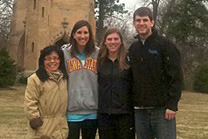President Steven Leath was a guest at the April 8 Faculty Senate meeting, updating members on several campus items.
"All in all, things are good," Leath said. "I'm very pleased with where we are and where we're going."
Among his remarks:
Fundraising
"We're doing really, really well. In the first year and three-quarters, we've raised nearly $82 million -- way ahead of the $30 million per year goal."
"What we're doing now is spending quite a bit of time organizing for another campaign."
Enrollment
"It is highly likely, you should expect that we'll be larger than 34,000 this year. We'll know more by summer."
"It's exciting that the minority population is growing the way it is. We're more diverse than we've ever been."
Efficiency study
"The one thing we did do was put off the academic program part until the fall because they're moving so quickly -- they want to do a lot of this by the summer. So we're trying to do much of the efficiency work on processes and things like this during the summer."
Performance-based funding (legislative distribution to regents universities)
"It's a lot of money -- nearly $500 million."
"They asked each president to present a possible reallocation model. We presented an actual plan on how to reallocate the money. It depends on exactly where your numbers come out, it's somewhere between a $50-$75 million swing from Iowa to the other two schools. So, you can imagine, it wasn't completely popular."
"The bottom line is, in the next two weeks the task force wants to have a model and vote on it and send it to the regents for voting as early as June. This is unprecedented speed for money of this magnitude. And you can imagine, it has huge potential implications for this school. Even if it's a $15-$20-$30 million shift, I don't know any time when we'll have an opportunity to have $20-$30 million come to us on a recurring basis that is totally unobligated. If that happens, I'll be coming back to this group because we need to have a real thoughtful approach to how to utilize that money to move this university forward."
Faculty-hiring initiative
"We've hired about 140 faculty members going into this academic year. We're recruiting for 114 at once, which is huge."
"The provost and I are really encouraging the deans to move aggressively to fill these."
Space issues on campus
"We need to free up more space on the main campus."
"We're going through a prioritization to move units off the central part of the campus to free up more space for faculty and students."
"We'll end up with over 50,000 square feet -- between the building in the research park and the Lincoln Way space -- that will move off of central campus."
New academic programs
In senate business, senators unanimously approved a pair of graduate degree programs in gerontology. The doctorate of philosophy and master of sciences degrees will be offered by the interdepartmental gerontology program.
A proposed minor in learning and leadership sciences also was approved, but did not receive unanimous support. The program would include six departments -- agricultural education and studies; agronomy; animal science; food science and human nutrition; horticulture; and natural resource ecology and management.
Rob Wallace, chair of the academic affairs council, said the College of Liberal Arts and Sciences recently approved another proposed minor in leadership studies. He said it likely would come before the senate in the fall.
"My own personal perspective is that these programs are not overlapping and serve different cohorts of students to provide leadership opportunities for students in several different colleges, with a slightly different curricular structure," Wallace said.
Other business
Senators will vote next month on four curricular items, including:
- Name change for the genetics graduate program, to genetics and genomics (Ph.D. and master of science degree)
- Name change for the bioengineering minor program, to biomedical engineering
- Name change for the agricultural history and rural studies graduate program, to program in rural, agricultural, technological and environmental history (Ph.D.)
- Discontinuation of the history of technology and science graduate program (Ph.D. and master of arts degree)
Four executive board members were elected into office for 2014-15, including three new council chairs. Tim Bigelow (electrical and computer engineering) will chair the academic affairs council; Teresa Paschke (integrated studio arts) will chair the faculty development and administrative relations council; and Martha Selby (materials science and engineering) will chair the governance council. Annmarie Butler (philosophy and religious studies) was elected to serve another term as senate secretary. All candidates ran unopposed.

